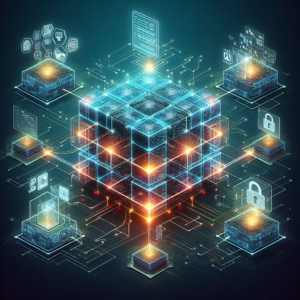Blockchain Technology: Revolutionizing Industries, But Can We Handle the Cybersecurity Risks?
 Blockchain technology has taken the world by storm, promising transparency, decentralization, and a revolution across various industries. However, with great power comes great responsibility, and blockchain introduces its own set of cybersecurity challenges. This article delves into the heart of blockchain, its technical intricacies, and the burning questions surrounding its vulnerabilities.
Blockchain technology has taken the world by storm, promising transparency, decentralization, and a revolution across various industries. However, with great power comes great responsibility, and blockchain introduces its own set of cybersecurity challenges. This article delves into the heart of blockchain, its technical intricacies, and the burning questions surrounding its vulnerabilities.
What is Blockchain?
Imagine a secure, transparent ledger, accessible to everyone yet tamper-proof. That’s blockchain in a nutshell. It’s a decentralized system where information is stored across a network of computers, eliminating the need for a central authority. This makes it ideal for transactions, supply chains, and even voting systems.
But Is It Safe? The Top Cybersecurity Concerns:
1. Smart Contract Vulnerabilities: These self-executing agreements, crucial for blockchain, can harbor hidden flaws. Hackers can exploit these vulnerabilities, leading to financial losses and stolen funds, just like the infamous DAO hack in 2016.
2. 51% Attacks: Imagine someone controlling the majority of the network’s computing power. This could allow them to manipulate transactions and disrupt the entire system, like the 2017 multi-signature wallet hack.
3. Private Key Woes: Losing your private key is like losing your bank password, except on steroids. Hackers can steal these keys and access your funds, as seen in the Coincheck exchange hack of 2018.
4. Regulatory Tightrope Walk: The decentralized nature of blockchain makes it challenging for authorities to enforce regulations, posing potential risks for illegal activities.
5. Supply Chain Snags: As blockchain integrates into supply chains, vulnerabilities in any node can compromise the entire system, leading to inaccurate data and disrupted operations.
Securing the Future of Blockchain:
Despite these challenges, the potential of blockchain is undeniable. So, how do we mitigate these risks and ensure a secure future for this technology?
Solutions We Need:
- Regular Code Audits: Just like regular checkups, smart contracts and blockchain code need continuous auditing to identify and fix vulnerabilities before they’re exploited.
- Educating Users: Empowering users with knowledge about secure key management, phishing scams, and safe online practices is crucial.
- Robust Network Security: Implementing strong protocols and alternative consensus mechanisms like Proof of Stake can make 51% attacks much less feasible.
- Collaboration is Key: Bringing together developers, industry players, and regulatory bodies is essential to establish clear frameworks that balance decentralization with compliance.
- Privacy-First Approach: Utilizing strong encryption and privacy-focused measures safeguards sensitive information within the blockchain ecosystem.
The Takeaway:
Blockchain technology is a game-changer, but cybersecurity risks demand our attention. By understanding the vulnerabilities and implementing robust solutions, we can harness the full potential of blockchain while building a secure and responsible digital future.
Want to learn more? Explore our additional resources to dive deeper into specific risks, solutions, and the ever-evolving world of blockchain technology.
